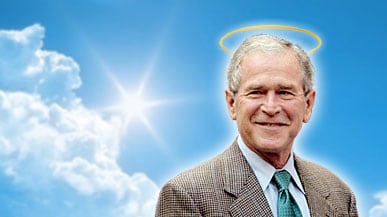On Sunday night, just two days before the Democrats were to be on the receiving end of what George W. Bush once called a midterm “thumpin’,” Bush was at Game Four of the World Series in Arlington. It felt like some prelapsarian time before Hurricane Katrina and 20-percent approval ratings. Perched on a motorized cart, Bush and his father drove in from the outfield like America’s relief pitchers, called in to get the country out of a jam. When W. hurled the first pitch, the crowd went nuts.
The publication of Bush’s memoir Decision Points, which hits stores November 9, is the key moment in what you might call the Bush Rehabilitation Project. Bush himself has long disdained grand, Nixonian plans to rescue his reputation. But his friends and former staff have spent the last two years using columns and cable microphones to do just that. And the release of the memoir—coming so close on the heels of Barack Obama’s repudiation—has led some Bushies to conclude that America is finally giving the Bush era a second look.
“His public rehabilitation is occurring much faster than I would have anticipated,” said Mel Martinez, a former U.S. Senator who was Bush’s first Housing and Urban Development Secretary.
“I believe that history is turning in his favor,” said Carlos Gutierrez, Bush’s former Commerce Secretary. “And I believe it will do so more and more as time goes by.”
When the Bush administration came to a rocky end on January 20, 2009, a staff famous for its message discipline was caught flat-footed. No one had much of a long-term p.r. strategy. “There was nothing very formal or structured,” Dana Perino, Bush’s ex-press secretary, told me. “Maybe somebody could argue there should have been.”
Nevertheless, Bush rehabilitation has raged across the media. Flip on cable news or open a web browser and you’re likely to bump into at least one member of the Bush diaspora. Perino appears as an analyst at Fox News, where her old colleague Karl Rove is also an analyst. Marc Thiessen writes for the Washington Post op-ed page, where Michael Gerson, another former Bush speechwriter, has written since 2007. Mark McKinnon and Nicolle Wallace write columns for The Daily Beast. Bill McGurn, another ex-speechwriter, is an executive at News Corp. Keith Hennessey, Bush’s director of the National Economic Council, writes a blog. Dick Cheney haunts TV green rooms and sends snarling statements to Politico. Rove, Thiessen, Condoleezza Rice, John Bolton, and Laura Bush have published books, while Cheney and Donald Rumsfeld have books on the way.

• The Lost Bush Memoir• Charlie Gasparino: 5 Economic Battles for ObamaInitially, some Bushies used the shock-and-awe approach to defend the administration. Just weeks after Obama moved into the White House, Dick Cheney—noting that he wasn’t speaking for Bush, but using the royal “we” in any case— blasted Obama and bragged that the previous administration hadn’t allowed another domestic Al Qaeda attack.
Karl Rove’s memoir Courage and Consequence—which is nearly 100 pages longer than Bush’s book—fought back on media narratives from Hurricane Katrina to Joe Wilson. History’s verdict on Bush, Rove wrote, would be “kind.”
Little made a dent. But to hear Bushies tell it, a number of things have changed since then that might sway America. One, Barack Obama is now the one with the slumping ratings. “People respect the fact that [Bush has] stayed off the radar screen and out of President Obama’s business,” said Mark McKinnon, a former advisor. “They have also watched Obama come down to earth and know that even Superman would have a tough time being president these days.”
An October CNN poll found Obama and Bush nearly tied—47 percent to 45 percent, respectively—on the question of who has been a better president.
Second, the Bushies say that despite his campaign promises, Obama’s administration has not fully repudiated Bush, on issues from the closing of Guantanamo Bay to military tribunals. That has made Bush’s positions look better in retrospect. “President Obama has started out in a different place, very different than President Bush,” Gutierrez said. “As he has faced reality, reality has pushed him into the Bush position.”
Tuesday’s results, Perino suggested, would finally show the Democrats that Bush-bashing, their favorite sport in the last two election cycles, was obsolete. So maybe America would stop hearing a chorus of negativity about W.
A final Bushie hope: that as the travails of his administration recede, Bush’s personal traits will come to the fore. “I think that over time and with this book,” McKinnon said, “most people will come to recognize that whether they liked his policies or not, that he is a genuinely decent and very good man whose motivations were pure.”
The irony is that the one guy not trying rescue Bush is Bush. Richard Nixon waged a post-presidential p.r. campaign until the country threw up its hands. In his presidential after-life, Bush is the anti-Nixon. “The former president even stays clear of Obama!” Matt Drudge yelped in his story about Bush’s book. But being hands-off has always been Bush’s m.o. Decision Points is not a political attack ala Cheney and Rove but an exegesis of some of Bush’s biggest movess. The thrust of it seems to be to remind readers that Bush had a busy presidency. As Perino put it to me, “How many people remember the anthrax attacks?”
Even allowing for the halo all “formers” wear—see the new, virtuous Bill Clinton—the bits about Bush’s life we’re allowed to see show a man who has no desire for political combat. Bush and the former First Lady, who sat next to him at the World Series, travel to far-flung speaking commitments. Bush keeps up his famous cardiovascular regimen. He deluges his friends with e-mail. He reads books on his e-reader—though W.’s vow of presidential silence extends so far that his staff is hesitant to say which brand.
In his presidential afterlife, Bush is the anti-Nixon.
“He does not seek the klieg lights,” Perino told me. “He always told me he would be an ex-president that would not criticize or weigh in on issues.”
“That applies to this president, President Obama, or all the presidents as long as George W. Bush is alive,” she continued. “He won’t do it.” Decision Points, then, should not just be seen as George W. Bush’s first pitch for post-presidential affection but as quite possibly his last.
Bryan Curtis is a national correspondent at The Daily Beast. He was a columnist at Play: The New York Times Sports Magazine, Slate, and Texas Monthly, and has written for GQ, Outside, and New York. Write him at bryan.curtis at thedailybeast.com.






